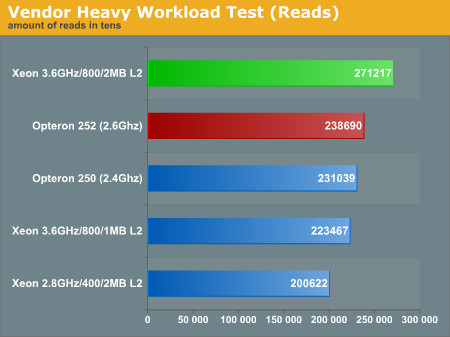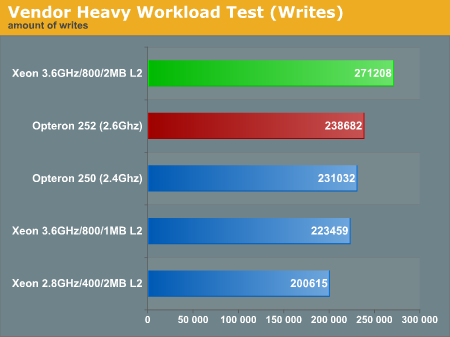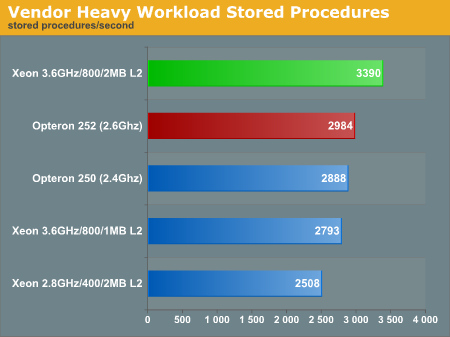Intel Xeon 3.6 2MB vs AMD Opteron 252 Database Test
by Jason Clark & Ross Whitehead on February 14, 2005 8:00 AM EST- Posted in
- IT Computing
"Order Entry" Stress Test results
Our Vendor test has received quite a bit of interest from certain processor vendors, rightfully so as the workload is quite difficult to recreate. As you can see from the results below, we have a completely different outcome from the SQL Stress results. The extra 1MB of L2 cache on the Xeon part made a significant difference. In a test formally dominated by the Opteron, the Xeon now takes a 12% lead. This test obviously benefits from the added cache, and the 800MHz front side bus does a much better job of moving the data than the slower bus architectures of the Xeon platform. In a previous article, we tested a 4MB Xeon part, and it barely managed a 3% gain over the Opteron - times have changed.


To give you an idea of the scale of this benchmark, we have graphs of stored procedures calls per second. We decided to focus on Stored Procedures / Second rather than Transactions / Second, as the definition of a Transaction can have a business context or a technical context.











97 Comments
View All Comments
semo - Tuesday, February 15, 2005 - link
is it possible to have a dual proc setup without using registered memory?Proton - Tuesday, February 15, 2005 - link
"We did a revamp of the tool itself, which is more performant on high volume queries."Performant?
Please read this article...
http://msdn.microsoft.com/msdnmag/issues/05/03/Edi...
"More recently, we've seen the word "performant" start its crawl into the everyday vocabulary of devspace. It is used to mean "highly performing." It's also not a word. When something provides information, it's informative. It's not "informant." The word "performant," if it existed, would be a noun—not an adjective. But it doesn't exist, so if you do see it in print, remember that it's not really there.'
ceefka - Tuesday, February 15, 2005 - link
#15 Jason, let me rephrase that#10: "However compact"... That would do it more justice ;-)I didn't thank you for the effort you and Ross put into this, did I? Your article came out together with the announcements of AMD. Hot stuff! How much time/sleep did you really have?
Viditor - Tuesday, February 15, 2005 - link
"What memory timings?"Good question...
"is it dual vs Dual or single vs single"
single vs single, 32bit
prd00 - Tuesday, February 15, 2005 - link
Wait... I think I miss something here.. is it dual vs Dual or single vs single?Zebo - Tuesday, February 15, 2005 - link
What memory timings?Viditor - Tuesday, February 15, 2005 - link
"I don't know if it fixes the IOMMU issue or not"As far as we know, it doesn't. The Smithfield is a desktop part, so that is to be expected...large quantities of memory aren't yet necessary for the desktop.
"Now this is interesting. Somewhere were Intel comes out on top by a big margin"
(grin) Only the most diehard AMD fan would deny Xeon's capabilities...
For a 1 or 2 CPU server that is used for low-end database serving or webserving, the new Xeon is excellent in 32bit (the CPU of choice)!
As the next few months grind ahead, we will see quite a few scenarios on review sites. My own suppositions are that
1. In a 1 or 2 single core Opteron system there is almost no bandwidth constraint. This is evidenced by the lack of change with the 25% HT increase to 1GHz. That said, we might see significant changes in 4 and 8 way systems, especially as dual cores come on-line.
2. We still have no reviews of these two platforms in 64bit using >4GB of ram. I suspect that Opteron will be much more effective there...
3. When Intel releases their mp Xeon Nocona, I suspect that 4 and 8 way Opteron systems will blow their doors off...my rationale is that the 1GHz HT links and AMD's MOESI cache protocol gives them a huge advantage in scaling processors.
Staples - Tuesday, February 15, 2005 - link
Now this is interesting. Somewhere were Intel comes out on top by a big margin.fitten - Monday, February 14, 2005 - link
BTW... there is a new chipset (or some new chipsets) being released soon along with the Smithdale CPU. I don't know if it fixes the IOMMU issue or not, but it might be worth a look...Viditor - Monday, February 14, 2005 - link
"no mention in any of the access scenarios is described as 32bit..."Oops...yes it does.
"Some devices, such as a large majority of PCI cards cannot directly access memory above the 4GB point"